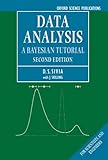Found in 2 comments on Hacker News
Jach · 2011-09-02
· Original
thread
I've recently started going through http://www.amazon.com/Data-Analysis-Bayesian-Devinderjit-Siv... and can highly recommend it. The benefits of Bayesian reasoning can be grasped somewhat easily without a detailed knowledge of the math, but at the end of the day scientists and engineers still need to learn how to use it and write programs using it to do stuff! One review mentions the book dives right into the subject, it does; I believe Bayes' Theorem is shown on page 6. Some people find a brisk pace hard to follow, personally I like it since I can always fill in the gaps with other material if needed. (Like Jaynes, or http://uncertainty.stat.cmu.edu/ )


If you read calculus with about the same fluency as the comic books then "Data Analysis: A Bayesian Tutorial" is awesome http://www.amazon.com/Data-Analysis-A-Bayesian-Tutorial/dp/0...
And if you would like a little more exposition (but still a mathematically sophisticated treatment) "Doing Bayesian Data Analysis: A Tutorial with R and BUGS" is fantastic http://www.amazon.com/Doing-Bayesian-Data-Analysis-Tutorial/...
The latter will also give you more details of how to approach classical, frequentest tests and summary statistics with their Bayesian equivalent.
Honestly I would say get both books as they're cheap and provide different insights. You only need to read a few chapters of each to see how you approach basic experiments from a Bayesian perspective.